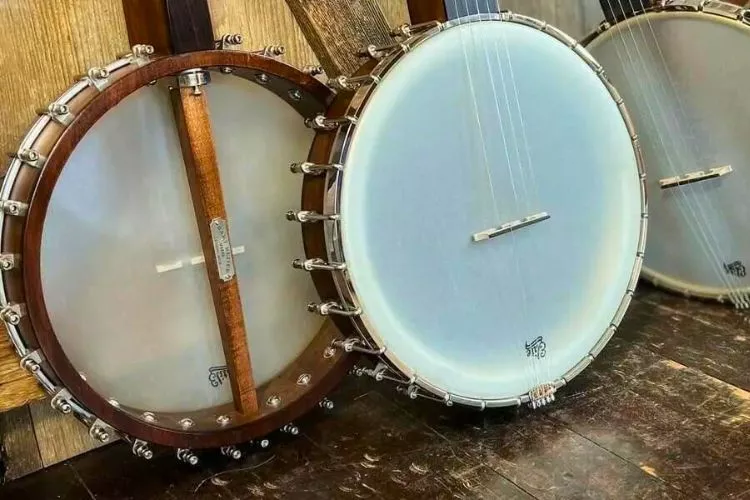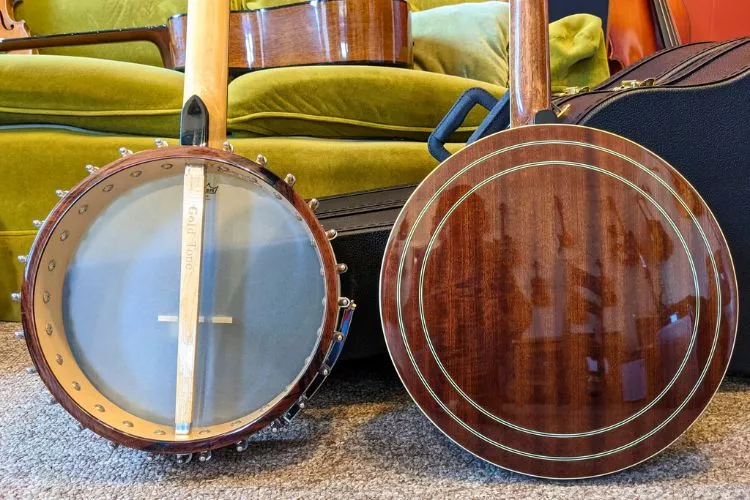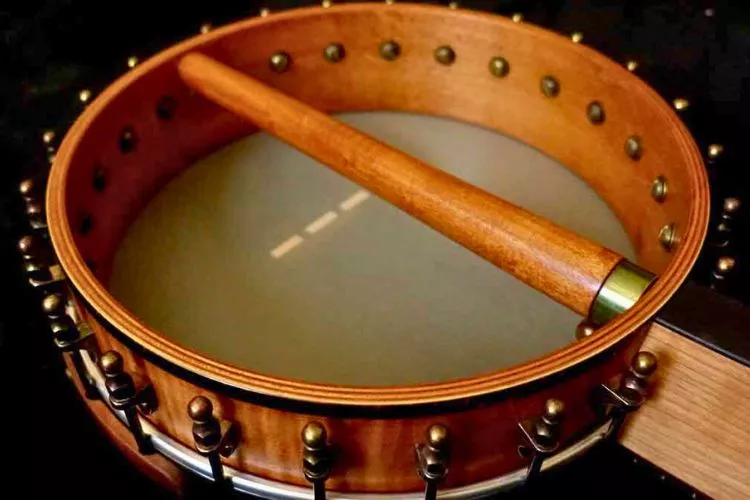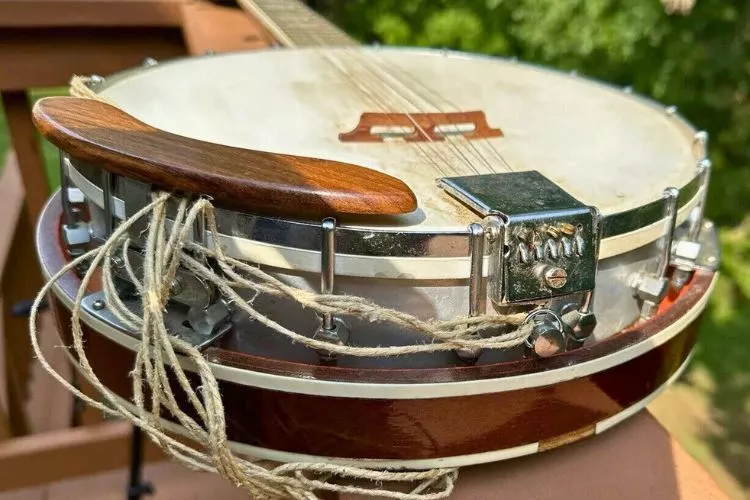The banjo, with its unique twang and bright sound, holds a significant place in several musical genres, most notably bluegrass, country, and folk music. When choosing a banjo, players are often faced with an important decision: open-back or closed-back?

While both instruments bear the name ‘banjo’, they offer different characteristics and are suited to different styles of music. This article delves into the differences between open-back and closed-back banjos, helping you decide which to choose based on your music preference and playing style.
Contents
🎶open back banjo vs closed
If possible, try out both types of banjos before making a decision. Spend time playing each, pay attention to their sounds, and feel how they resonate with your music sensibilities. Music is a personal journey, and the instrument you choose can become a trusted companion on that journey. Whatever you choose.

Characteristics of Open-back Banjos
Open-back banjos, often associated with traditional folk and old-time music, derive their name from the lack of a resonator on the back. This design results in a quieter and warmer tone, which is ideal for claw hammer or frailing styles of playing. The absence of the resonator also reduces weight, making open-back banjos more comfortable to hold for prolonged periods.
The unique tonal characteristics of open-back banjos derive from the way the sound directly interacts with the player’s body. Since there is no resonator to project the sound forward, some of it is absorbed by the player, creating a more intimate sound experience – one that’s perfect for solo playing or small, informal jam sessions.
Characteristics of Closed-Back Banjos
On the other hand, closed-back or resonator banjos are generally louder, brighter, and have a more percussive tone. This makes them well-suited for more aggressive picking styles such as the finger-picked bluegrass style, where the banjo often competes with other instruments for auditory space.
The reason for this louder sound is the resonator – a wooden disc attached to the back of the banjo. This resonator projects the sound forward and prevents absorption by the player’s body, effectively doubling the instrument’s volume compared to its open-back counterpart. Closed-back banjos are heavier due to the added resonator, which may be a consideration for some players.
Sure, below are detailed comparative analyses of open back and closed (or resonator) banjos in the contexts of sound, bass, and bluegrass music:
Sound
Open back and closed (resonator) banjos have distinct sound profiles due to their differing constructions.
- Open Back Banjo: These typically produce warmer and softer tones than resonator banjos. The sound is directed towards the player, which makes the open back banjo less piercing and softer to the audience. They’re mostly used in claw hammer or frailing styles of playing.
- Closed (Resonator) Banjo: The resonator banjo is louder and has a brighter tone than its open back counterpart. This is due to the resonator at the back of the banjo, which projects the sound forward, making it an excellent choice for performances in larger venues.
Bass
The amount of bass produced by a banjo is influenced by a variety of factors, including its design and the materials used in construction.
- Open Back Banjo: These banjos tend to exhibit a plunky, lower-volume bass tone that is ideal for solo performances and fingerpicking styles such as clawhammer.
- Closed (Resonator) Banjo: Resonator banjos usually produce a more resonant bass tone due to the resonator reflecting the sound waves off the back. This creates a full, bright, and loud sound. If a stronger bass sound is preferred, a resonator banjo is typically the better option.
Bluegrass
Bluegrass, a genre typically featuring rapid and often complex banjo picking techniques, is heavily influenced by the type of banjo used.
- Open Back Banjo: Musicians rarely use an open back banjo for bluegrass. It doesn’t carry the volume or provide the sharp “snap” often associated with bluegrass music’s driving banjo sound.
- Closed (Resonator) Banjo: This type of banjo is the preferred choice for bluegrass music. The resonator produces a louder, brighter sound essential to cut through when playing with a full bluegrass band. It provides the twangy, bright, and percussive sound that bluegrass banjo is renowned for.
In conclusion, both open back and resonator banjos have unique benefits and aspects to consider. Choosing between the two largely depends on the type of music you intend to play and personal preference.
🎶How to Choose Between Open-Back and Closed-Back Banjos?
Choosing between an open-back and closed-back banjo depends largely on the style of music you intend to play. For traditional clawhammer or frailing styles found in a lot of folk and old-time music, an open-back banjo would likely be the better choice due to its warmer, mellower tone. These banjos are also lighter and could be more comfortable for long playing sessions.
On the contrary, if you’re interested in playing bluegrass or prefer a brighter, louder sound that can hold its own against other instruments without requiring amplification, a closed-back banjo would be more appropriate. Closed-back banjos are also capable of a wider tonal range due to the resonator, offering more versatility in certain situations.
Whether to go for an open-back banjo or a closed-back banjo ultimately comes down to your personal preference, the style of music you want to play, and perhaps, the level of comfort desired, given the weight differences between the two. Remember, neither type is inherently better than the other; they’re simply different tools for different jobs. You might even find that you enjoy playing both, depending on the situation!
🎶 Pros and Cons of Open Back Banjo

Pros
- Lighter Weight: Open back banjos are lighter than resonator banjos, making them easier to hold and play for extended periods. They are comfortable to play while sitting, standing, or walking around.
- Warm and Mellow Sound: The open back banjo produces a softer, warmer, and mellower tone, which is well-suited for intimate settings, solo performances, and certain old-time styles like clawhammer or frailing.
- Lower Price: Open back banjos are generally less expensive than resonator models due to fewer parts and simpler construction.
Cons
- Lower Volume: The open back design doesn’t project the sound forward like a resonator banjo, resulting in a lower volume, which may not be suitable for playing in loud situations or with a full band.
- Limited Sound Options: While the warm, mellow tone of an open back banjo is well suited for certain styles, it lacks the sharp and bright sound that is characteristic of bluegrass and other genres.
🎶 Pros and Cons of Closed (Resonator) Banjo

Pros
- Loud and Bright Sound: Resonator banjos are designed for maximum volume and projection, with a bright and cutting tone that can be heard in large venues and in ensemble settings, such as with a bluegrass band.
- Versatility: Resonator banjos can be used for multiple genres, including bluegrass, country, and folk music. They can also be adapted for certain old-time styles by removing the resonator, though the result will not be identical to a true open back banjo.
- Rich Tone and Better Sustain: The resonator design provides the banjo with a richer and fuller tone, as well as greater sustain, which is useful for various playing styles and techniques.
Cons
- Heavier Weight: Resonator banjos are heavier than open back banjos due to additional components, such as the resonator and flange. This can make the instrument more challenging to play for long periods, especially for beginners.
- Higher Price: The additional parts and construction complexity of a resonator banjo generally result in higher prices compared to open back models.
- Less Suitable for Certain Styles: While the resonator banjo is versatile, its bright and punchy sound may not cater to the warm, plucky nuances of certain old-time clawhammer or frailing styles.
You may also read: 4 string vs 5 string banjo
Conclusion:
The choice between open back banjo vs closed (resonator) banjo depends on your musical preferences, playing style, and physical comfort. The former offers a warm, mellow sound and is lighter and more affordable, ideal for claw hammer styles and solo performances.
The latter, with its powerful volume, bright tone and richer bass, is excellent for energetic genres like bluegrass and performance contexts. Therefore, taking the time to consider your needs and to experiment with both types of banjos before making a decision is advisable.
